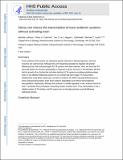| dc.contributor.author | LeRoux, Michele | |
| dc.contributor.author | Culviner, Peter H | |
| dc.contributor.author | Liu, Yue J | |
| dc.contributor.author | Littlehale, Megan L | |
| dc.contributor.author | Laub, Michael T | |
| dc.date.accessioned | 2021-10-27T20:22:31Z | |
| dc.date.available | 2021-10-27T20:22:31Z | |
| dc.date.issued | 2020 | |
| dc.identifier.uri | https://hdl.handle.net/1721.1/135215 | |
| dc.description.abstract | © 2020 Elsevier Inc. The toxin-antitoxin (TA) systems encoded on bacterial chromosomes have long been thought to act as effectors of a cellular stress response system. LeRoux et al. find that, despite strong transcriptional induction following various stress treatments, the toxins of TA systems are not activated under these conditions. | |
| dc.language.iso | en | |
| dc.publisher | Elsevier BV | |
| dc.relation.isversionof | 10.1016/J.MOLCEL.2020.05.028 | |
| dc.rights | Creative Commons Attribution-NonCommercial-NoDerivs License | |
| dc.rights.uri | http://creativecommons.org/licenses/by-nc-nd/4.0/ | |
| dc.source | PMC | |
| dc.title | Stress Can Induce Transcription of Toxin-Antitoxin Systems without Activating Toxin | |
| dc.type | Article | |
| dc.contributor.department | Massachusetts Institute of Technology. Department of Biology | |
| dc.contributor.department | Howard Hughes Medical Institute | |
| dc.relation.journal | Molecular Cell | |
| dc.eprint.version | Author's final manuscript | |
| dc.type.uri | http://purl.org/eprint/type/JournalArticle | |
| eprint.status | http://purl.org/eprint/status/PeerReviewed | |
| dc.date.updated | 2021-07-21T14:12:55Z | |
| dspace.orderedauthors | LeRoux, M; Culviner, PH; Liu, YJ; Littlehale, ML; Laub, MT | |
| dspace.date.submission | 2021-07-21T14:12:57Z | |
| mit.journal.volume | 79 | |
| mit.journal.issue | 2 | |
| mit.license | PUBLISHER_CC | |
| mit.metadata.status | Authority Work and Publication Information Needed | |
